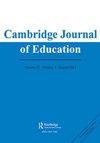Theoretical contributions to the investigation of educational effectiveness: towards a dilemmatic approach
IF 1.5
3区 教育学
Q2 EDUCATION & EDUCATIONAL RESEARCH
引用次数: 2
Abstract
ABSTRACT The study of educational effectiveness has become increasingly complex. Alongside methodological advancements in the investigation and measurement of educational effectiveness, meta-analyses conducted by leading researchers have shown that the field has been suffering from a significant lack of theory or from a weak theoretical basis. The present paper seeks to address this gap by connecting the four models of organisational effectiveness incorporated in Quinn and Rohrbaugh’s framework of competing values to the four dualities of educational design that appear in Wenger’s theory of communities of practice. By doing so, the paper contributes theoretical insights towards the development of a dilemmatic approach to the study of educational effectiveness. Based on the theoretical insights offered here, the paper argues that effective educational organisations are those that are able to address successfully and on an ongoing basis paradoxical tensions and incorporate interrelated and yet contradictory elements of the educational process and school organisation.对教育有效性研究的理论贡献:走向两难的方法
教育有效性的研究变得越来越复杂。除了在调查和测量教育有效性方面的方法进步之外,由主要研究人员进行的荟萃分析表明,该领域一直受到理论严重缺乏或理论基础薄弱的困扰。本文试图通过将Quinn和Rohrbaugh的竞争价值框架中包含的四种组织有效性模型与温格的实践社区理论中出现的教育设计的四种二元性联系起来,来解决这一差距。通过这样做,本文为发展教育有效性研究的两难方法提供了理论见解。基于本文提供的理论见解,本文认为,有效的教育组织是那些能够成功地、持续地解决矛盾的紧张关系,并将教育过程和学校组织中相互关联但又相互矛盾的因素结合起来的组织。
本文章由计算机程序翻译,如有差异,请以英文原文为准。
求助全文
约1分钟内获得全文
求助全文
来源期刊

Cambridge Journal of Education
EDUCATION & EDUCATIONAL RESEARCH-
CiteScore
5.30
自引率
4.30%
发文量
35
期刊介绍:
Cambridge Journal of Education publishes original refereed articles on all aspects of education, with a particular emphasis on work that contributes to a shared understanding amongst academic researchers, theorists, practising teachers, policy-makers and educational administrators. The journal also welcomes the submission of systematic review articles that summarise and offer new insights into specific areas of educational concern. With a wide international readership, Cambridge Journal of Education publishes contributions drawn from different educational systems and cultures enabling continued in-depth discussion of global educational theory, policy and practice. The journal’s Special Issue programme encourages and stimulates focused discussion and engagement with significant themes and responses to topics raised by readers and contributors. Cambridge Journal of Education welcomes proposals for future editions.
 求助内容:
求助内容: 应助结果提醒方式:
应助结果提醒方式:


